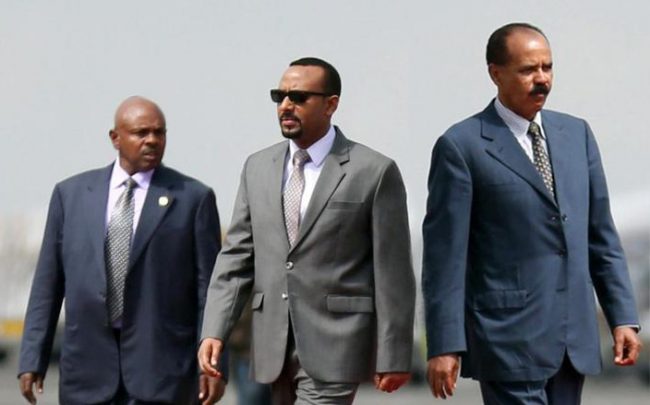Radio Erena: 11 October 2019
 Evidently, only partners can make peace. While Ethiopian Prime Minister Abiy Ahmed won Nobel Peace Prize for 2019, his partner Eritrean president Isaias Afewrki did not. The Norwegian Nobel Committee cited the reasons for Abiy Ahmed´s accomplishment: ¨ The Norwegian Nobel Committee has decided to award the 2019 Nobel Peace Prize to Ethiopian Prime Minister Abiy Ahmed Ali for his efforts to achieve peace and international cooperation, and in particular for his decisive initiative to resolve the border conflict with neighboring Eritrea. ¨
Evidently, only partners can make peace. While Ethiopian Prime Minister Abiy Ahmed won Nobel Peace Prize for 2019, his partner Eritrean president Isaias Afewrki did not. The Norwegian Nobel Committee cited the reasons for Abiy Ahmed´s accomplishment: ¨ The Norwegian Nobel Committee has decided to award the 2019 Nobel Peace Prize to Ethiopian Prime Minister Abiy Ahmed Ali for his efforts to achieve peace and international cooperation, and in particular for his decisive initiative to resolve the border conflict with neighboring Eritrea. ¨
Meanwhile the remark on his initiative toward Eritrea is clear, his Eritrean counter part´s role was mentioned in the same report only in passing: ¨In close relation with Isaias Afewrki the President of Eritrea, Abiy Ahmed quickly worked out the principles of the peace agreement to end the long ¨no peace no war¨ stalemate between the two countries. ¨
In contrast to 1979 when Egyptian President Anwar Sadat and the Israeli Prime Minister Menachem Begin won jointly the Nobel peace prize, and also unlike in 1994 when Yasser Arafat and Israeli Prime Minister Yitzhak Rabin won it for their peace-making in the Middle East, Nobel Committee didn’t award its 100th prize jointly to the two Horn of Africa leaders. The reasons may be clear but still, vary according to the onlookers.
Adam Taylor of The Washington Post gives his answer by saying that the Eritrean president is on top of a repressive regime. Martin Plaut of the Institute of Commonwealth Studies in London says ¨There are few signs that the peace agreement is leading to real benefits for the communities on either side of the border, ¨premature¨ is the main reaction of many Eritreans. ¨ As the benefits of peace are not yet fully seen in Eritrea in particular, many would find rewarding Abiy Ahmed as a premature move.
In Paris, the Eritrean refugee Ahmed G. says ¨The Nobel Committee should have cited the Sudanese Peace Deal sponsored by Abiy Ahmed than his peace agreement with Eritrea as a reason for awarding him the prize¨ he concludes hopelessly: ¨that peace agreement between Ethiopia and Eritrea is already dead and doesn’t even deserve a tin medal. ¨
13 months after the peace agreement between Eritrea and Ethiopia, Eritreans agree that the country has not benefited from it at all. When Ethiopian Airlines resumed its flights to Asmara on 18 July 2018, after twenty years of break many Eritreans wondered who would be allowed to fly out of the country in these planes. Eritreans are never allowed to fly out of the country except in droves of youth, who still escape army conscription, mainly and ironically to Ethiopia.
The general agreement among Eritreans is that peace brought no benefit so far to the country. Others share serious doubts about Abiy Ahmed himself deserving the prize while his troops are still occupying the Eritrean town of Badme.
Mohamed Ali Sheib of the Eritrean Council for Democratic Change (ECDC) believes that ¨peace was not president Isaias’s choice, he didn’t work for it, therefore, it´s natural that he is not awarded the prize ¨ When Abiy Ahmed proposed peace, president Isaias did not have the choice but to accept, therefore he is not an initiative-taker, he is rather a secondary player and thus he remains¨. He adds.
President Isaias Afewrki´s stand toward peace is well-expressed in his rounding up of G-15, the first paramount group of Eritrean decision-makers who voiced the need for peace with Ethiopia as early as 2000. They were all stigmatized as traitors; nineteen years later, their whereabouts are still unknown. The person who has placed them and many others behind bars hasn’t got a reason to be awarded a peace prize.
By Fathi Osman
==================
